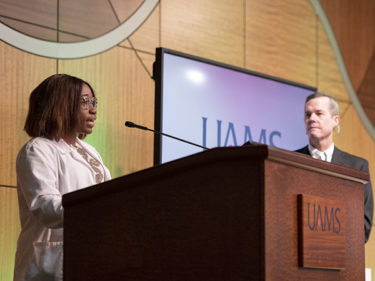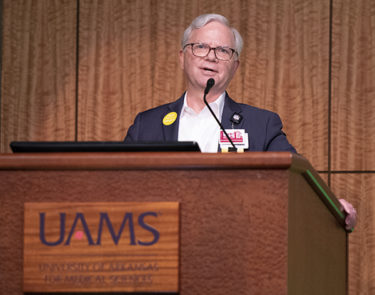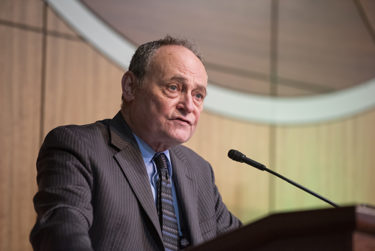View Larger Image

Chancellor Cam Patterson listens as Whit Hall recounts his personal experience with philanthropy as a transplant patient.
Image by Evan Lewis
Town Hall Highlights Importance of Philanthropy, Day of Giving
| Names of donors and benefactors are on buildings, lecture halls, programs and endowed chairs throughout UAMS.
With its focus on philanthropy and the UAMS Day of Giving, the Chancellor’s Town Hall meeting April 14 was in one of those examples of giving, the Fred W. Smith Auditorium on the 12th floor of the Jackson Stephens Neurosciences and Spine Institute.

Tia’Asia James, left, speaks about how important a scholarship has been to her medical education as Chancellor Patterson listens.Image by Evan Lewis
Smith was chairman of the Donald W. Reynolds Foundation Board of Trustees, which donated tens of millions of dollars to UAMS over the life of the foundation, funding central to the Donald W. Reynolds Institute on Aging and numerous other university projects.
April 14 also was the UAMS Day of Giving, one day focused on raising funds and in-kind donations for the UAMS Health system’s greatest needs. Many of the donations come from the university’s faculty and staff. This year’s appeal to the workforce and donors raised a total of $352,933.
“Philanthropy provides essential support in all three of our mission areas,” Chancellor Cam Patterson, M.D., MBA, said. He introduced a roster of Town Hall speakers who gave dozens of examples of the ways in which philanthropy has been critical to fulfilling those missions.
Steppe Mette, M.D., senior vice chancellor, UAMS Health and UAMS Medical Center CEO, addressed the importance of philanthropy to clinical care, and Michael Birrer, M.D., Ph.D., vice chancellor and director of the UAMS Winthrop P. Rockefeller Cancer Institute, its role in research.
Mette broke down the meaning of the word ‘philanthropy,’ which roughly translates from its roots in Greek to the ‘love of mankind.’
“We are here for the betterment of mankind, the love of mankind,” Mette said. “So, philanthropy is giving back to humanity. It’s inseparable from the delivery of health care. There are examples all around us on the main campus and every part of UAMS.”
Although the word conjures up associations with major monetary donations, broadly the meaning of philanthropy covers much more.

Steppe Mette, M.D., explains the meaning of the word ‘philanthropy’ at the Chancellor’s Town Hall.Image by Evan Lewis
Mette said he recently saw several seemingly small but meaningful examples of it in a patient care technician who brought old clothes from home so a homeless patient would have something to wear on discharge; in a busy screener stopping to give detailed directions to two patients navigating the main campus; and in a nurse finding a wheelchair for someone although her shift was ending.
Birrer discussed how important philanthropy has been as the Cancer Institute has pursued National Cancer Institute Designation, a competitive assessment process that brings substantial benefits in federal research funding as well as clinical trials of new treatments.
As part of that effort, philanthropy has helped with the recruitment of physicians and researchers and to “fill in the gaps” in funding for researchers who have finished one grant project but are waiting on funding for the next, he said.
“Frequently, but not always, there also are fewer strings attached to philanthropic gifts,
Birrer said. “I like nothing more than getting a donation with the instruction that ‘this is at the director’s discretion.’ That allows me to do many things I can’t do with an NIH or NCI grant where the budget is basically fixed. Flexibility is important.”
Scott Dickson, M.D., director of the residency program at the UAMS Northeast Regional Campus in Jonesboro, received an endowed chair and spoke about the flexibility it has given him in forming new collaborations in the Jonesboro area.

Michael Birrer, M.D., Ph.D., discusses the role philanthropy plays in research funding.Image by Evan Lewis
Neonatologist Whit Hall, M.D., who was a cornea transplant patient, explained how deeply grateful he is for the Jones Eye Institute for restoring his eyesight with the help of an organ donation of corneas from an 11-year-old girl who died.
“None of this would have been possible for me without UAMS, without the wonderful clinical care and research here and skills we teach here,” Hall said. “I am redoubling my efforts to repay her, Arkansas Regional Organ Recovery Association and UAMS. I’m going to put my money where my mouth is.”
Hall then handed a check to Chancellor Patterson equivalent to one week of his salary. Patterson also offered his own $2,500 challenge gift to raise funds for the UAMS Stocked & Reddie. The food pantry is available for any employee or student who feels they are food insecure.
Tia’Asia James, a third-year UAMS College of Medicine student who received the Edith Irby Jones Scholarship in her first year, and Erika Jasso, M.D., a resident in Northwest Arkansas who who received the Dr. Lee and Beverly Parker and Raymond Miller scholarships as a student, both spoke about how important the financial support was to their education.
Angela Wimmer, vice chancellor for Institutional Advancement, updated the audience on the Day of Giving, which by the time of the noon Town Hall had raised more than $250,000 for the university.